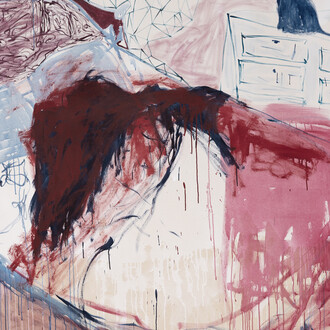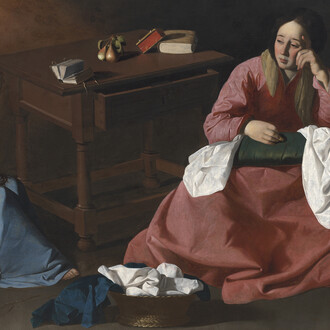London’s major arts institutions are providing a strong platform for contemporary Palestinian artists. 2015 saw ICA present Dor Guez, Chisenhale Gallery Jumana Manna, Whitechapel Emily Jacir and IWM Rosalind Nashashibi, whilst Tate Modern will show Mona Hatoum in 2016. It is against this backdrop that The Mosaic Rooms, London, opens Suspended Accounts - a multimedia exhibition of six young Palestinian artists, all winners and finalists selected from the latest A.M. Qattan Foundation Young Artist of the Year Award. The show presents a snapshot of the practices of today’s emerging Palestinian artists, supplementing the presentations of their more established peers.
Suspended Accounts, curated by Viviana Checchia, is the first UK presentation of the 2014 Young Artist of the Year Award (YAYA14). This biennial award - organised by the Ramallah-based A.M. Qattan Foundation - has been running since 2000, and has acted as a springboard for now increasingly well-known Palestinian artists - including YAYA12 First Prize winner Jumana Manna. Exhibited artists include Bashar Khalaf (First Prize winner), Noor Abu Arafeh (Second Prize), Noor Abed and Farah Saleh (joint Third Prize), Hamody Gannam and Iman Al Sayed. The artists are globally located and under the age of 30. They were selected by a jury of internationally-renowned creatives: Asuncion Molinos Gordo, Kamal al-Jafari, Michael Rakowitz, Nida Sinnokrot and Samia Halaby.
The works shown are diverse - spanning film, performance and painting - but unified through a shared theme of ‘Suspended Accounts,’ they explore ideas around invisible narratives, self-historicisation and imagination. Bashar Khalaf’s A Shadow of the Shadow (2014) seeks to bring the vision of established Palestinian artist Suleiman Mansour into the present; each painting in Khalaf’s series sits in dialogue with a specific painting by Mansour presented alongside it. Noor Abu Arafeh’s video installation Observational Desire on a Memory that Remains (2014) is an attempt to present an alternative archive of Palestinian art history – translating undocumented and imagined works in the medium of film, whilst questioning what remains in memory. Noor Abed’s video installation Penelope (2014) explores ideas of futility, homeland and time, taking inspiration from Homer’s Odyssey.
Farah Saleh examines the significance of gesture through the history of a certain socio-political group, in her interactive video dance installation A Fidayee Son in Moscow (2014), she invites viewers to experience the Interdom, a Moscow school built to host children of international revolutionary parents – including those of the Palestinian leftist leadership. Hamody Gannam’s sound installation of archive boxes Wadi Nisnas (2014) aims to remember the stories the occupation attempts to erase through a series of interviews with residents of Wadi Nisnas, a segment of what remains of Haifa’s old city. Iman Al Sayed’s mixed media installation Re-repeat (2014) explores her father’s memories and archival material as a means of connecting with her own Palestinian identity and questioning the function of memory both real and imaginary.
Scattered globally, or born and raised away from the land of their parents, many of these artists seek to connect with their Palestinian identity by imagining, reflecting on, or appropriating others’ experiences. They explore the memories of their parents and elders, examine archives, imagine and construct undocumented artifacts, question recorded histories, and interrogate ideas of selfhistoricisation.
The exhibition contributes to London’s current artistic focus on the region. It examines aspects of Palestinian history, identity and politics from the perspective of a younger generation of artists who have experienced it from different locales. YAYA14 has been envisioned by the curator as a long term project. It grew from an intensive process in which the curator and the artists connected, learnt, critiqued and developed their work over time, through virtual forums as well as one-to-one discussion and group sessions. The same principle has been used for this London presentation, where the selected artists and curator have been meeting online to discuss and re-envision the work in the particular context of The Mosaic Rooms. This focus on learning and development, local and international engagement, follows through to the public program, which will present a number of events curated by the artists themselves in order to link, expand and question their practices through connection with other international artists and academics.
YAYA confirms its presence as one of the most eagerly-anticipated and instrumental artistic interventions for those working and interested in the art scene in Palestine. Since its inception in 2000, YAYA has presented generations of young artists that are ambitious to occupy a space in the art world. This 2014 edition took place in a local context that was weighted by the consequences of the last Israeli war on Gaza, and in a regional context troubled by conflict, giving such cultural opportunities as the YAYA increased resonance and significance at this time.
















